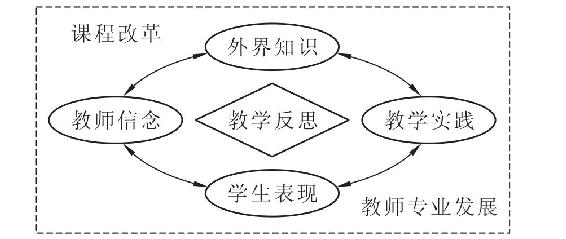二、本书的框架
在以上对教师专业发展过程的论述中,豪本从复杂理论提出的教师专业学习系统提醒我们,同时从认知建构主义和社会建构主义看教师专业发展的重要性,教师学习是多种要素共同作用的结果。早期经典的教师专业发展模式的局限性使我们进一步认识到教师在实践中学习的重要性,以及教师应该在学习中扮演更加积极的角色。加斯克的模式强调教师在课程发展中、在教师的探究中学习。克拉克等人虽然重视反思在教师专业发展中的作用,提出各要素之间具有缔造和反思的关系,却没有能够提供有力的论据支持所提出的理论构想,但是其注重教师学习所处的变革环境思想是值得借鉴的。舒尔曼从个人-社群观提出教师学习的模式,他们也认为各要素之间需要教师的反思作用来联结,但并没有说明反思在其中发生什么作用,是如何发生作用的。总结以上教师专业发展过程的理论,对本研究的启示是:教师的专业发展是个人与环境互动的结果。因此,“人境互动”将是本研究探究教学反思在教师回应课程改革的挑战,以及教学反思与教师专业发展关系时的基本观点。把外界知识、教师的信念、行为和学生表现作为教师专业发展中四个关键要素。
基于以上发现,本研究提出了如图3.6所示的理论框架。这个理论框架由三部分构成:课程改革、教师专业发展和教学反思。下面在对各个部分及其之间关系的分析中解释本理论框架的构思。

图3.6 本研究的理论框架
(一)教师专业发展的要素
教师专业发展由教师的信念、外界知识、教学实践和学生表现四个要素组成。在四个要素之间的关系上,并不认同早期经典的教师专业发展模式和加斯克的模式都以教师在职培训作为起点的观点。对教师而言,这种做法中的规训多于赋权。是通过教师教育者改造教师,而不是让教师自己来发展。其内含的逻辑是,如果教师的专业要发展,就要无条件地让教师接受教师教育者所宣讲的一切。奉行的是外在控制的教师专业发展取向,容易忽视教师所学知识运用的具体环境。因此,教师的专业发展不容易与教师的课程发展结合起来。我们认为教师专业发展可以从任何一个要素开始。例如,从教师的信念开始,有利于使外界的知识顺利地与教师已有的信念发生联系,造成认知冲突,通过同化和顺应来实现自己认知结构的改变。从教学实践开始,则有利于关注实践中的问题,通过问题解决来促进教师的专业发展。从学生表现出发,能够帮助我们从更根本地认识教学活动的性质和效果。总之,不论是教师的信念,还是教学实践和学生表现,都是教师所关心的问题,从教师的角度出发进行专业发展的。从这个角度出发,也就意味着重视教师在专业发展中的能动性,从内在控制取向来促进教师专业发展。
教师的信念、教学实践和学生表现三个要素组成了一个封闭的循环过程。在这个过程中,教师不断地通过反思来总结经验。教师之间很少交流,教师也不能通过在职专业发展活动获得新的知识和信息。当加入外界知识这个要素后,教师专业发展的过程就变成了开放的系统。不论是校内同事的分享,校外专家的引领,还是教师通过阅读获得的知识,都成为刺激教师成长的动力源。合作的文化是这种教师专业发展模式的重要特征。
(二)教学反思与教师专业发展的关系
前文讨论过教学反思的性质及其对专业发展的意义。如果我们进一步探究教学反思和教师专业发展关系时,首先需要回答的一个问题是:教师专业发展是教学反思的“条件”?还是教学反思的“结果”?我认为可以从分析教师专业发展入手回答这个问题。对于教学反思而言,我们可以把教师专业发展分为两个范畴:一是作为条件的教师专业发展,二是作为结果的教师专业发展。在本研究,认为教学反思缘起于教师回应课程改革的要求,也就是说,课程改革的要求是教师进行教学反思的“因”。那么有了这个原因,教师如何才能进行教学反思呢?这里面的条件可以分为两类:一类是课程实施过程中所进行的反思,例如在教学的过程中,在自己备课时,在课后的个人思考,办公室同事之间的聊天等。我们可以把这类称之为工作场景中的教学反思。另外一类教师在专门的为实施新课程而组织的专业发展活动中所进行的教学反思,如教师在参加培训中,在各种为新课程而组织的赛课、研究课中等。我们可以把这类称之为教师专业发展场景中的教学反思。
既然教学反思起因于实施课程改革的需要,那么教学反思的作用最终要表现为课程发展上。不过,教学反思对课程发展的作用是需要通过教师专业发展这个中介的,教学反思是通过教师之“人”的发展来影响课程之“事”发展的。
讨论教学反思和教师专业发展关系时另外一个重要问题是:教学反思是如何作用于教师专业发展的?在“教学反思的过程”中根据多位学者的论述,归纳教学反思的过程是:首先发现实践情境中困惑或惊奇的现象,然后对这个现象及实践情境进行深入的描述,之后结合外界知识的基础上进行诠释和分析,最后在行动中加以验证。这个过程与本理论架构中教师专业发展的过程有相似之处:对教学实践的关注,外界知识的参与和运用教师的信念与知识来诠释与分析实践等。在这种关系中我们能够发现,对于教师而言,他们处于纷繁复杂的各种日常教学活动中,通过教学反思能够使教师意识到自己究竟进行了哪些实践活动,这些实践活动的后果是什么,以后引导这些活动的信念是什么。也就是说,通过教学反思,教师专业发展过程中的各个要素才能从教师忙忙碌碌的工作中分离出来,进入教师的思维世界,作为分析的对象。并通过教学反思来寻找各个要素之间的关系,并在解释与分析这些要素及其关系的过程中来“认识”自己的实践,识别改善实践的其他途径。教学反思是教师专业发展的一个重要组成部分。教师专业发展不仅需要他们不断地获取新知,善加实践,而且还需要他们用心去反思自己和他人的所作所为与思想感受,从而达到“知”“行”与“思”的相互促进与统一。(66)
【注释】
(1)Day,C.(1999a).Developing teachers:the challenges of lifelong learning.London/Philadelphia:Falmer Press.p.4.
(2)Fullan,M.(2001).The New Meaning of Educational Change(3rded.).New York:Teachers College.pp.134-135.
(3)Darling-Hammond,L.(1998).Teacher learning that supports student learning.Educational leadership,55(5),6-11.
(4)Richardson,V.&Placier,P.(2001).Teacher change.In V.Richardson(Eds.),Handbook of research on teaching.(4thed.,905-946).Washington,D.C.:Adfsamerican Educational Research Association.
(5)Zeichner,K.M.(1983).Alternative paradigms of teacher education.Journal of Teacher Education,34(3),3-9.
(6)Ernest,P.(1989).The knowledge,beliefs and attitudes of the mathematics teacher:a model. Journal of Education for Teaching,15(1),13-31.
(7)Hargreaves,A.&Fullan,M.G.(1992).Introduction.In A.Hargreavs and M.Fullan(Eds.). Understanding teacher development(1-19).New York:Teachers College Press.
(8)Mezirow,J.(1991).Transformative dimensions of adult learning.San Francisco:Jossey-Bass. Schubert,W.H.(1986).Curriculum:perspective,paradigm,and possibility.New York:Macmillan.霍秉坤、黄显华(2000):《课程行动研究模式之探讨》,载《华东师大学报(教科版)》,70(4),21~ 30。
(9)Spillane,J.P.(1999).External reform initiatives and teachers beliefs to reconstruct their practice:the mediating role of teachers’zones of enactment.Journal of curriculum studies.31(2),143-175.
(10)Kennedy,M.M.(2002).Knowledge and teaching.Teachers and teaching:theory and practice,8(3/4),355-370.
(11)Shulman,L.S.(1987).Knowledge and teaching:foundations of the new reform.Harvard Educational Review.57(1),1-22.
(12)Floden,R.E.(2001).Research on effects of teaching:a continuing model for research on teaching. In V.Richardson(Eds.),Handbook of research on teaching(4thed.,3-16).Washington,D.C.:American Educational Research Association.
(13)Hamilton,D.&McWilliam,E.(2001).Ex-centric voices that frame research on teaching.In V. Richardon(Eds.),Handbook of research on teaching(4thed.,17-43).Washington,D.C.:American Educational Research Association.
(14)陈美玉:《教师专业实践理论与应用》,20页,台湾:师大书苑,1996。
(15)王建军、黄显华:《课程发展与教师专业发展》,载黄显华、朱嘉颖编著,《一个都不能少:个别差异的处理》,2002。
(16)陈惠邦:《教育行动研究》,110页,台湾:师大书苑,1998。
(17)Darling-Hammond,L.(1998).Teacher learning that supports student learning.Educational leadership,55(5),6-11.
(18)陈美玉:《教师专业学习与发展》,4页,台湾:师大书苑,1999。
(19)Fullan,M.(2001).The New Meaning of Educational Change(3rded.).New York:Teachers College.124.
(20)陈美玉:《教师专业实践理论与应用》,142页,台湾:师大书苑,1996。
(21)Burbules,N.C.&Bruce,B.C.(2001).Theory and research on teaching as dialogue.In V. Richardson(Eds.),Handbook of research on teaching(4thed.,1102-1121).Washington,D.C.:American Educational Research Association.
(22)陈美玉:《教师专业学习与发展》,15页,台湾:师大书苑,1999。
(23)Ingvarson,L.,Meiers,M.,&Beavis,A.(2005).Factors affecting the impact of professional development programs on teachers’knowledge,practice,student outcomes and efficacy.Education policy analysis archives.13(10),1-26.Richardson,V.(2003).The dilemmas of professional development.Phi Delta Kappan,84(5),401-406.
(24)Mclaughlin,M.W.&Oberman,I.(1996).Introduction.In M.W.Mclaughlin,&I.Oberman(Eds.),Teacher learning:new policies,new practices(IX-XI).New York:Teachers College Press.pp.Ⅸ-Ⅺ
(25)Fullan,M.&Hargreavs,A.(1992).Teacher development and educational change.In M.Fullan&A.Hargreaves(Eds.).Teacher Development and Educational Change(pp.1-9).London,New York:Falmer.
(26)Connelly,F.M.,&Clandinin,D.J.(1988).Teachers as curriculum planners:narratives of experience.Columbia:Teachers College.p.81.
(27)Goodson,I.(2000).Professional knowledge and the teacher’s life and work.In C.Day,A. Fernandez,T.E.Hauge&J.Moller(Eds.).The Life and Work of Teachers:International Perspectives in Changing times(pp.13-25).London and New York:Falmer Press.
(28)周淑卿:《课程发展与教师专业》,179~180页,台湾:高等教育,2004。
(29)Hoyler,E.&John,P.D.(1995).Professional knowledge and professional practice.London:Cassell.
(30)周淑卿:《课程发展与教师专业》,台湾:高等教育,2004。
(31)陈美玉:《教师专业实践理论与应用》,83~85页,台湾:师大书苑,1996。
(32)周淑卿:《课程发展与教师专业》,181页,台湾:高等教育,2004。
(33)Richardson,V.(2003).The dilemmas of professional development.Phi Delta Kappan,84(5),401-406.
(34)Putnam,R.T.&Borko,H.(1997).Teacher learning:Implications of new views of cognition.In B.J.Biddle,T.L.Good,&I.F.Goodson(Eds.),International Handbook of Teachers and Teaching(1222-1295).Netherlands:Kluwer Academic Publishers.
(35)Bell,B.&Gilbert,J.(1994).Teacher development as professional,personal,and social development.Teaching and Teacher Education,10(5),483-497.
(36)Day,C.(1999a).Developing teachers:the challenges of lifelong learning.London/Philadelphia:Falmer Press.p.2.
(37)Falk,B.(1996).Teaching the way children learn.In M.W.Mclaughlin&I.Oberman(Eds.). Teacher learning:new policies,new practices.(22-29).New York:Teachers College Press.p.28.
(38)Richardson,V.&Placier,P.(2001).Teacher change.In V.Richardson(Eds.),Handbook of research on teaching.(4thed.,905-946).Washington,D.C.:Adfsamerican Educational Research Association.
(39)Franke,M.L.,Carpenter,T.,Fennema,E.,Ansell,E.,&Behrend,J.(1998).Understanding teachers’self-sustaining,generative change in the context of professional development.Teaching and Teacher Education,14(1),67-80.
(40)引自Smylie,M.A.(1995).Teacher learning in the workplace:implications for school reform.In T.R.Guskey&M.Huberman(Ed.).Professional development in education:new paradigms and practice.(92-113).New York:Teachers College.
(41)Gordon,S.P.(2004).Professional development for school improvement:empowering learning communities.Boston:Pearson.
(42)Day,C.(1999a).Developing teachers:the challenges of lifelong learning.London/Philadelphia:Falmer Press.p.67.
(43)陈惠邦:《教育行动研究》,台湾:师大书苑,1998。
(44)Hargreaves,A.(1995).Development and desire:a postmodern perspective.In T.R.Guskey&M. Huberman(Ed.).Professional development in education:new paradigms and practices(pp.9-34).New York and London:Teachers College Press.
(45)Thompson,M.D.(2001).Teachers experiencing authentic change:the exchange of values,beliefs,practices and emotions in interactions.Discussion paper submitted to experiencing change,exchanging experience virtual conference,25 June-13 July.
(46)俞国良、辛自强:《教师信念及其对教师培养的意义》,载《教育研究》,16~20页,2002(5)。
(47)引自Pajares,M.F.(1992).Teachers’beliefs and educational research:cleaning up a messy construct.Review of Educational Research,62(2),307-332.Richardson,V.(1996).The role of attitudes and beliefs in learning to teach.In J.Sikula(Eds.),Handbook of research on teacher education.(2nded.,102-119).New York:Simon&Schuster Macmillan.
(48)苏子:《香港幼儿教师的教学信念》(香港中文大学博士学位论文),2004。
(49)Nespor,J.(1987).The role of beliefs in the practice of teaching.Journal of Curriculum Studies,19,317-332.
(50)引自Nespor,J.(1987).The role of beliefs in the practice of teaching.Journal of Curriculum Studies,19,317-332.
(51)林进材:《教师教学思考——理论、研究与应用》,台湾:高雄复文图书出版社,1997。
(52)Pajares,M.F.(1992).Teachers’beliefs and educational research:cleaning up a messy construct. Review of Educational Research,62(2),307-332.
(53)Calderhead,J.(1996).Teachers:beliefs and knowledge.In D.V.Berliner&R.C.Calfee(Eds.),Handbook of educational psychology.(709-725).New York:Simon&Schuster Macmillan.
(54)Richardson,V.(1996).The role of attitudes and beliefs in learning to teach.In J.Sikula(Eds.),Handbook of research on teacher education(2nded.,102-119).New York:Simon&Schuster Macmillan.
(55)Pajares,M.F.(1992).Teachers’beliefs and educational research:cleaning up a messy construct. Review of Educational Research,62(2),307-332.
(56)Guskey,T.R.(1985).Staff development and teacher change.Educational leadership,42(7),57-60.Guskey,T.R.(2002).Professional development and teacher change.Teachers and teaching:theory and practice,8(3/4),381-391.
(57)Clarke,D.&Hollingsworth,H.(2002).Elaborating a model of teacher professional growth. Teaching and teacher education,18(8),947-967.
(58)Hoban,G.F.(2002).Teacher learning for educational change.Buckingham/Philadelphia:Open University Press.
(59)周淑卿:《课程解构或理论建构——后现代课程论之再思》,载《后现代的课程实践研讨会》,台湾:国立台北教育大学,2005。
(60)Clarke,D.&Hollingsworth,H.(2002).Elaborating a model of teacher professional growth. Teaching and teacher education,18(8),947-967.
(61)Richardson,V.(2003).The dilemmas of professional development.Phi Delta Kappan,84(5),401-406.
(62)Schön,D.A.(1983).The reflective practitioner:how professionals think in action.New York:Basic Books.
(63)Shulman,L.S.(1986).Paradigms and research programs in the study of teaching:A contemporary perspective.In M.C.Wittrock(Ed.),Handbook of research on teaching(3rded.,3-36).New York:Macmillan.
(64)Putnam,R.T.&Borko,H.(1997).Teacher learning:Implications of new views of cognition.In B.J.Biddle,T.L.Good,&I.F.Goodson(Eds.),International Handbook of Teachers and Teaching.(1222-1295).Netherlands:Kluwer Academic Publishers.
(65)Shulman,L.S.&Shulman,J.H.(2004).How and what teachers learn:a shifting perspective. Journal of curriculum studies,36(2),257-271.
(66)赵明仁、袁晓峰:《理论引领的教师专业发展模式》,载《教育理论与实践》,2006。
免责声明:以上内容源自网络,版权归原作者所有,如有侵犯您的原创版权请告知,我们将尽快删除相关内容。















